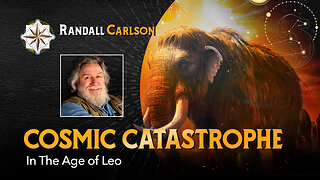Premium Only Content

Gold Dust in Australia Explains, 100 monkeys, Great Family Divide!, Deception is getting bigger,
The Hundredth Monkey Phenomenon is a concept that gained popularity in the 1970s, stemming from an anecdotal story about the behavior of Japanese macaque monkeys on the island of Koshima. It's important to note that while the story has been widely circulated, there's skepticism about its scientific validity, and the details have been challenged.
The story goes like this: In the 1950s and 1960s, researchers were studying the behavior of Japanese macaque monkeys. On Koshima Island, one young female monkey, named Imo, reportedly learned to wash sweet potatoes before eating them. This behavior was observed to spread among the younger monkeys in the population.
The pivotal moment in the narrative is when, as the story goes, the hundredth monkey learned to wash sweet potatoes. Supposedly, at that point, a sudden and unexplained leap in consciousness occurred, and all the monkeys on the island, as well as those on neighboring islands, started washing sweet potatoes.
The popularized version of the story suggests that the behavior change was not a result of direct physical contact or learning but rather a kind of critical mass or collective consciousness shift. This idea was then metaphorically extended to human behavior, suggesting that when a critical mass of individuals adopt a new idea or behavior, it can lead to a spontaneous and widespread change in the collective consciousness of the population.
Critics argue that the narrative surrounding the Hundredth Monkey Phenomenon lacks scientific support and that the story may have been distorted or exaggerated over time. Skeptics point out that the original observations of monkey behavior on Koshima may not have been accurately reported or interpreted.
In scientific terms, the spread of behavior in animal populations often involves social learning, imitation, and the transmission of cultural traits. However, the specific notion of a sudden, mystical shift in consciousness as described in the Hundredth Monkey Phenomenon is met with skepticism and is not widely accepted within the scientific community. It's crucial to approach such anecdotes with a critical mindset and rely on empirical evidence and well-established scientific principles when evaluating claims.
To watch full episode go Here ! - https://rumble.com/v42okp2-mike-in-the-night-e539-christmas-special-headline-news-next-weeks-news-toda.html
Hundredth Monkey Phenomenon, Collective Consciousness, Social Learning,
Animal Behavior, Japanese Macaques, Koshima Island, Cultural Transmission,
Behavioral Change, Metaphor, Critical Mass, Consciousness Shift,
Skepticism, Scientific Validity, Anecdotal Story, Sweet Potato Washing,
Imo the Monkey, Popularized Narrative, Scientific Community,
Empirical Evidence, Monkey Studies, Imitation, Cultural Traits,
Social Networks, Information Transmission, Evolutionary Psychology,
Learning Patterns, Collective Behavior, Cultural Evolution,
Behavioral Ecology, Population Dynamics, Anthropology,
Cognitive Science, Storytelling, Scientific Skepticism
-
 7:09
7:09
Mike Martins Channel
7 days ago $0.11 earnedF in Lyers
4893 -
 4:17:00
4:17:00
Tundra Tactical
17 hours ago $15.51 earnedSHOT SHOW 2025!!!!!! Whats Are We Looking Forward To Most
94.8K13 -
 22:53
22:53
Film Threat
23 hours agoA TRIBUTE TO VISIONARY DIRECTOR DAVID LYNCH | Film Threat News
3.62K2 -
 20:30
20:30
Exploring With Nug
23 hours ago $0.61 earnedMissing Father of 2 FOUND Underwater In Shallow Pond!
2.78K2 -
 19:19
19:19
This Bahamian Gyal
1 day agoThe View PRAISES Michelle Obama for DITCHING TRUMP inauguration, "when they go LOW, go even LOWER"
1.76K7 -
 14:25
14:25
Degenerate Jay
18 hours agoThe Flash Movie Failed Because People Hate The Character? Sure.
2.69K4 -
 28:30
28:30
CharLee Simons Presents Do Not Talk
5 days agoSam Anthony from YourNews.com (with host CharLee Simons)
6.08K -
 52:34
52:34
PMG
14 hours ago $0.42 earnedHannah Faulkner and Steve Friend | EXPOSE THE FBI CORRUPTION - KASH PATEL
3.81K1 -
 25:33
25:33
marcushouse
1 day ago $35.61 earnedStarship Exploded! What Went Wrong? Flight Test 7 Explained
168K59 -
 1:00:50
1:00:50
Squaring The Circle, A Randall Carlson Podcast
1 day ago#035 Cosmic Catastrophe In The Age Of Leo - Squaring The Circle: A Randall Carlson Podcast
105K28